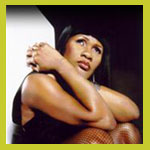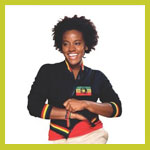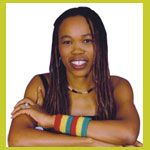Articles about reggae music, reviews, interviews, reports and more...
Women in Reggae: saluting the sisters

Women in Reggae: saluting the sisters
Davina Morris looks at the changing face of reggae for the women of the industry.
IT SEEMS that there’s a changing tide for the ladies in the reggae industry. The rising success of a new wave of women in the genre, has given focus and sparked admiration for the sisters who choose not to have themselves defined as sexual objects.
 Even long-serving queen of slackness, Lady Saw, has, in more recent times, opted for tunes of a more inspiring nature. The release of her 2007 album Walk Out left many of her fans shocked, as the raunchy artist dubbed ‘Mumma Saw’, explored themes of pain and loss, as well as encouraging people to love themselves, regardless of whether or not they lived up to society’s notion of beauty.
Even long-serving queen of slackness, Lady Saw, has, in more recent times, opted for tunes of a more inspiring nature. The release of her 2007 album Walk Out left many of her fans shocked, as the raunchy artist dubbed ‘Mumma Saw’, explored themes of pain and loss, as well as encouraging people to love themselves, regardless of whether or not they lived up to society’s notion of beauty.
Today, artists such as Etana and Queen Ifrica are quickly garnering much respect for their conscious messages, which touch on everything from identity to affairs of the heart to injustices experienced in society and much more.
Similarly, the rising profile of singers like Tami Chynn– who was recently signed by Akon to his Konvict Muzic label– as well as Alaine and Kris Kelly, is encouraging news for those aspiring female artists who wish to push out good music and not their breasts.
Interestingly, rising roots songstress Etana– who recently released her debut album, The Strong One– was once better-known for music of a more raunchy nature.
 In 2000, she joined a female quartet called Gift. At the time, Universal Records was interested in the group’s music, so Etana reluctantly agreed to wear the skimpy outfits dictated by the music industry’s pervasive stereotyping of female artists. But she soon saw the light– the video light.
In 2000, she joined a female quartet called Gift. At the time, Universal Records was interested in the group’s music, so Etana reluctantly agreed to wear the skimpy outfits dictated by the music industry’s pervasive stereotyping of female artists. But she soon saw the light– the video light.
“We were shooting a video and we had on Victoria’s Secret pink lingerie, thongs and black stiletto heels,” Etana recalls. “The cameraman had the camera in a really compromising position. I was wondering, what is he looking at? I was very uncomfortable so I walked out and that was it.”
It was then that she ditched the weave and reverted to her old style of natural hair and long skirts, and embraced a new musical direction. Her hit song Wrong Address found favour amongst wide audiences, for its hard-hitting look at the prejudice shown to those who live in ghetto areas. Her goal as an artist? To set a new standard for women in reggae.
“I want people all over the world to look at Jamaican women in a different light,” she says. “That’s why I decided to no longer go by my birth name, Shauna– which means ‘pretty’– and instead, go by Etana, which means ‘strong’ in Swahili. Women have so much power and strength and they need to realise that.”
She continues: “Times are changing. Now, women are getting their fair time on stage, they’re getting featured properly on the flyers for shows– things are getting better. And those are the standards that I set for myself.”
One leading– and long-serving– lady, well-known for the social and political content of her music, is, of course, Tanya Stephens. The popular singer, who won critical acclaim for her albums Gangsta Blues and Rebelution, certainly isn’t into stripping off to sell records.
“I find that really stupid because singing is a sound and not a look,” she says. “And I don’t believe that it’s the public who are crying out for sex symbols in the music industry. I’ve never heard of any consumer going into a record shop and asking for a record by the sexiest artist the record shop has.”
“There are many female artists who have enjoyed success through positive lyrics and without taking their clothes off. Tracy Chapman did it, Alanis Morisette did it and there are others just like them.”
 Sharing those sentiments is Queen Ifrica, whose hit song Daddy touched even the frostiest of hearts, with its observation of incest and sexual abuse that featured the poignant chorus, “Daddy, don’t touch me there.”
Sharing those sentiments is Queen Ifrica, whose hit song Daddy touched even the frostiest of hearts, with its observation of incest and sexual abuse that featured the poignant chorus, “Daddy, don’t touch me there.”
For Queen Ifrica, singing on real life issues was always her musical mission.
“I always had a mindset in terms of what I wanted to achieve and I knew that it would come with obstacles,” she says. “When I released Daddy, there was, initially, a nonchalant approach from some people when it came to promoting it. It was only the more radical DJs, who acknowledged that it was a hit, who played it and then the public backed it. It would seem that it’s easier for female artists to take their clothes off in order to gain success. But my think is about morals.”
“I think it’s also about what you want from the business; whether you’re doing it for love or money. I’m in this business for the love of music and a desire to spread conscious messages and messages of truth and what is right.”
It’s not just female artists who are flying high in the reggae industry.
There are a legion of ladies behind the scenes working as managers, vice presidents, record company execs, promoters, DJs, journalists, and in various other positions, which aim to promote the genre.
One such lady is entertainment consultant, Sharon Burke, whose many roles include artist management, bookings, production and publicity. Her company, Solid Management, looks after talents including Bounty Killer, Wayne Marshall and Etana. But she acknowledges that being a woman in the reggae business is by no means easy, with some guys still attempting to make the sisters feel inadequate.
“They do that all the time but I’m above that,” she says. “I think some men are jealous of the progression of women in the business, but times are changing.”
There are many men who have been very supportive of me and I truly appreciate that. I think it’s a mark of a strong and talented woman in this business when men around them acknowledge their talent and ability.”
Getting respect from the fellas is something Etana can certainly relate to. But then, respect is something she always shows to others and always expects in return.
“I work with Fifth Element– one of the top roots record companies in Jamaica,” she says. “So when we’re on tour, when I come off the tour bus, is like 30 man behind me; walking behind me like I’m royalty.”
“When I’m to go on stage, two of them will lift me onto the stage and then walk me off when I’m done. I’m treated with so much respect and that’s how women– and all people– should be treated.”
Read comments (1)
| Posted by Nicko7 on 08.24.2010 | |
| Good article and BIG RESPECT, LOVE and BLESSINGS to the mentioned artists I have brought cd's by all of them purely on the strength of the music in particular the words to a lot of the songs, eg Daddy, No less a woman, Wrong address POWERFULL Tunes So carry on Sisters. From a man point of view, you are all beautifull woman Big up to you for letting your music do the talking, and not allowing yourselfs to be turned into sex objects to sell records. At the end of the day most of the woman who use the sex angle, are here today gone tomorrow. | |
Comments actually desactivated due to too much spams
Browse by categories
Recommended Articles
Latest articles
Recently addedView all
© 2007-2026 United Reggae. All Rights Reserved. Reproduction in whole or in part is prohibited. Read about copyright
Terms of use | About us | Contact us | Authors | Newsletter | A-Z














